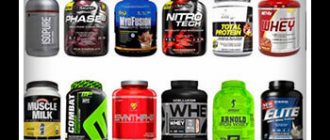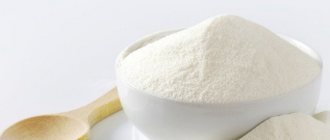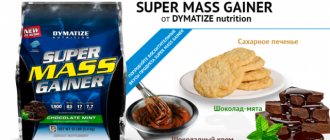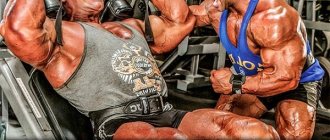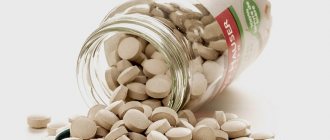The value of proteins as a nutritional component for athletes is beyond doubt. Protein ( protein ) is the most important building material for muscles. Without regular protein intake, it is impossible to grow or maintain muscle mass. The recommended daily dose of protein is 2-3 g per 1 kg of athlete’s weight.
It is possible to get it from regular food (meat, eggs, fish, cottage cheese, etc.), but “in addition” we will get extra amounts of carbohydrates and fats that are contained in food. That is why protein sports nutrition is taken both for weight loss and for weight gain - usually in the form of drinks made from dry mixtures.
However, simply buying the first package of protein you come across and starting taking it is not enough. The fact is that protein is represented by different types, each of which has its own specifics. One variety will be ideal after a workout, another will be suitable for an evening meal, and the third will work in several directions at once. To understand which types of protein will be preferable for a particular athlete, you should analyze them. Proteins can be classified by the type of protein it is made from, as well as by the types of filtration.
The best protein manufacturers - which company to choose
High-quality protein can be purchased in specialized stores, but not on the market or from hand.
It is better to buy sports nutrition from trusted manufacturers who have been working in this field for at least 3-5 years:
- Optimum Nutrition;
- Dymatize;
- Weider;
- BSN;
- Muscle Pharm.
The products of these companies are distinguished by a high degree of purification, good digestibility and pleasant taste. You can get acquainted with all the advantages of the best protein supplements from famous brands in our rating.
However, any bodybuilder will tell you that you need to select protein shakes individually, taking into account all the characteristics of your body. This is the only way you can achieve maximum effect from their use.
Recommendations: 9 best sports nutrition manufacturers
Composition and effect of protein on the body
Protein is extracted from natural products, that is, it is an extract obtained from the same food that we eat every day - meat, fish, milk, legumes and grains. It contains about 70-90% protein, the rest of the mixture consists of vitamins, creatine, carbohydrates and other substances necessary for the body.
The main task of protein supplements is to ensure the fastest possible gain of muscle mass. Once in the body, the protein is broken down into amino acids and absorbed into the blood. Next, it is transferred to muscle tissue, strengthening its structure and making it denser.
However, there are protein supplements that help you lose weight: they support muscle health by forcing the body to draw energy reserves from stored fat rather than from muscles.
Benefits of protein for the body
Protein in our body serves the following purposes:
- metabolic processes – ensuring proper metabolism in the body;
- immunity - proteins are the antibodies that protect us from infections and viruses;
- transportation – strengthening the circulatory system, protein delivers useful substances to every cell of our body;
- building material - these substances are the basis of cellular structure;
- energy – 1 gram is equal to 4 kcal, but the body begins to use protein storage when the supply of carbohydrates runs out.
Our body does not produce protein on its own, but takes it from food. People who eat poorly and irregularly, engage in sports or mental activity may not receive it in the required amount.
Without receiving the daily protein requirement, the body begins to become depleted. To avoid this, you need to balance your diet.
Types of protein
Whey
This type of protein is obtained from boiled whey, in which, under the influence of high temperature, the milk protein coagulates and is easily separated from the rest of the liquid. It is quickly broken down and absorbed by the body (within about 2 hours) and is an excellent restorative agent after serious physical exertion.
It is also recommended to take it in the morning to stop catabolism - a process when the body, hungry overnight, begins to draw energy reserves from muscle tissue.
Protein, after heat treatment and filtration of whey, can undergo additional purification from fats and carbohydrates or be sent to the shelves “as is.”
Depending on how high the degree of filtration of the finished product is, there are three subtypes of such additives:
1. Concentrate is the most affordable option. It contains about 60-80% protein, the rest being fat and carbohydrates. Concentrated protein is obtained in the first stage of whey filtration.
2. Isolate – does not contain lactose and is absorbed faster than concentrate. In it, protein occupies up to 92-95%, and fat content does not exceed 1%. This degree of purification is achieved by microfiltration or reverse osmosis.
3. Hydrolyzate - here the protein molecules are already broken down into amino acids, which are instantly absorbed by the body and immediately enter the general bloodstream.
Pros:
- Ideal amino acid profile;
- Quickly digested and absorbed into the blood within 20-40 minutes;
- Perfectly restores muscle fibers after intense training;
- Can be used both at the drying stage and when gaining weight;
- Has a pleasant taste;
- Relatively inexpensive.
Minuses:
- Not suitable for people with milk protein intolerance - the only exception is isolate.
Casein
This protein is also obtained from milk, only pre-skimmed (buttermilk). It is absorbed very slowly - from 6 to 8 hours, gradually saturating the body with amino acids. Most often it is taken for weight loss and drying the body, because it satisfies the feeling of hunger for a long time.
Casein can be supplied as a split hydrolysate or micellar protein obtained by ultrafine filtration of milk. The latter is able to “feed” the body with protein for 10-12 hours.
Pros:
- Gives a long-lasting satiety effect and reduces appetite;
- Includes a rich set of amino acids;
- Stimulates protein synthesis in muscles;
- It has a complete amino acid composition and contains a decent dose of calcium;
- Ideal to take before bed, preventing muscle catabolism.
Minuses:
- As with whey protein, it is not suitable for athletes with lactose intolerance;
- The taste is not for everyone.
Egg
The so-called reference protein, which contains neither fats nor carbohydrates, but contains almost all the amino acids the body needs, as well as a whole range of microelements and vitamins.
It is produced from chicken eggs, removing the yolk and all moisture from them. This is a medium-rate protein that begins to break down in the body an hour after consumption and nourishes it for 4 hours.
Pros:
- Almost 100% digestibility;
- Rich in minerals, trace elements and vitamins;
- Does not contain fat;
- Dulls the feeling of hunger;
- Excellent recovery after training.
Minuses:
- Rarely produced in pure form;
- Expensive;
- Causes allergies in people sensitive to egg white.
Meat
Its properties are close to 85% whey isolate, but unlike it, it does not cause problems for people with lactose intolerance. Meat protein is usually obtained from beef and must be purified, removing cholesterol and fats.
Pros:
- Suitable for those who cannot tolerate milk protein or gluten;
- Has a balanced composition of amino acids;
- Contains its own creatine;
- Quickly and almost completely absorbed by the body.
Minuses:
- It's not cheap;
- Has a bitter taste.
Vegetable
Plant protein is most often obtained from soybeans, but it can also be obtained from rice, peas, hemp or wheat. This is an acceptable option for vegetarians, although the amino acid profile is very far from ideal. To improve the quality of plant protein, leucine is added, which actually makes muscles grow.
Pros:
- Does not contain substances of animal origin;
- Has an average absorption rate;
- One of the cheapest protein options.
Minuses:
- Incomplete digestibility;
- Poor composition of amino acids;
- Frequent use and large doses provoke flatulence.
Vegetarians should take a closer look at hemp proteins. Their composition is richer than that of soy extract, which allows them to somehow compensate for the lack of animal proteins in the diet.
Plant proteins: what foods contain them?
Our body is able to synthesize protein from a few plants, and most of it is in the following crops:
- peanuts – 100 grams of nuts contain about 20 grams of protein;
- beans – 23 gr./100 gr.;
- chia seeds – 20 g./100 g., a plus is the higher calcium content than in dairy products;
- chickpeas – 19 g/100 g;
- quinoa – 16 g/100 g, the amount of amino acids is almost equal to dairy products.
It is difficult to meet your daily intake with vegetable protein alone. On average, a person needs one and a half grams of protein per 1 kg of their weight, so everyone has their own level of daily requirement.
Protein Selection Options
Amino acid profile
Protein is the main component of protein powder, but this general name hides entire groups of numerous acids, which determine the nutritional value of a particular supplement.
A good mixture should contain 18 amino acids, including branched chain BCAAs, which are responsible for building muscle and burning excess fat. The BCAA family is represented by a trio of essential amino acids (leucine, isoleucine and valine) - the higher their percentage in the powder, the better.
Unfortunately, manufacturers do not always indicate the profile of their product, so you have to rely on the average statistical indicators for different types of protein:
1. Whey and casein - contain all the necessary protein amino acids, with about half being essential. The percentage of BCAAs is also the highest here.
2. Albumin (egg) - despite being fully digestible, it is not as good as proteins from dairy products. It lacks 2 essential amino acids - lysine and valine (the second is part of the BCAA group).
3. Beef - contains the necessary amino acids and even the obligatory branched-chain trinity, but in a very small amount, if converted to protein weight.
4. Vegetable - is something between egg and meat protein, contains 16 of the 18 protein amino acids.
Composition and additional ingredients
Often on the shelves you can see multicomponent protein supplements, including 2-3 types of proteins. In this case, you should carefully study the composition on the back of the package: the substances that the mixture contains most should be listed first.
That is, if soy protein is written down first, and then whey protein, then you have in your hands just a herbal supplement enriched with dairy components - no matter what the large letters on the label promise.
Pay attention to the percentage of fat and carbohydrates in the protein powder - they should be no more than 3-4%. But the presence of dietary fiber can bring considerable benefits to your gastrointestinal tract. They improve the absorption of the protein shake, and also eliminate the traditional side effect of the protein “diet” – gas formation in the intestines.
Protein mixtures may contain flavorings: chocolate, fruit, vanilla, etc. It all depends on your preferences. But remember that you will have to drink a protein shake every day, so buy products with an unobtrusive and pleasant taste. Or take several different ones and use them alternately.
The main thing is that the protein does not contain harmful artificial sweeteners:
1. Saccharin;
2. Aspartame;
3. Cyclamate.
Contraindications
There are few contraindications for taking protein, but they still exist.
The main ones are:
1. Individual lactose intolerance;
2. Diarrhea;
3. Allergy;
4. Frequent abdominal pain, colic, flatulence;
5. Kidney failure.
If you have such problems, you will have to be especially careful in selecting the type of protein or avoid taking it altogether.
Which protein to choose
1. For good muscle growth, it is better to buy whey protein in concentrate form. It breaks down quickly and almost immediately begins to supply the muscles with the necessary amino acids. Pay attention to the composition of the mixture - there should be no proteins of plant origin, as they will reduce the concentration of the BCAA group. It is also worth adding hydrolyzate to your diet and drinking it immediately after strength training.
2. Cutting bodybuilders need the cleanest possible formulations - without fats and carbohydrates. A whey isolate that has undergone microfiltration, or better yet a reverse osmosis system, is suitable for them. At night, it is advisable to drink a cocktail with casein - it will saturate the body for a long time and stop the catabolic processes that destroy muscle tissue.
3. For people who want to lose extra pounds, protein formulations with a low or medium rate of absorption and an almost complete absence of fats are suitable: egg, vegetable, casein or multi-component - whatever you have enough money for. Supplements that improve digestion are welcome.
4. Athletes with individual milk intolerance are better off using whey isolate, meat, vegetable or egg protein. The last two products can be consumed during drying, beef protein when gaining muscle mass, and lactose-free whey - in both cases.
5. On free days between workouts, it is recommended to take a complex protein containing a maximum of nutrients and vitamins. The main thing is that the proteins included in its composition have different rates of digestibility.
Animal proteins: in what products and in what quantities?
Animal protein can be easily obtained by eating the following foods:
- red fish - rich in vitamins, contains omega fats, 100 grams of product - 3.22 grams. protein;
- chicken meat – 20 g./100 g., a healthy and affordable product; when dieting, it is always recommended to eat only brisket;
- beef – 19 gr. protein in 100 gr. meat, a healthy product with low fat content;
- cheese – 25 g./100 g., due to its high fat content, it is not recommended for frequent consumption during sports diets;
- cottage cheese – 17 g/100 g, the slowest digestible type of protein;
- milk - only 3 g/100 g, easily digestible; as a separate source of protein it is poor, but suitable for adding to a protein shake or omelet.
Since animal proteins are richer in amino acids than plant proteins, they are considered complete. For supporters of vegetarianism, it is impossible to fill the norm with only plant foods. Therefore, they have to take supplements and carefully think through their menu.
Protein is vital for every person, so you should monitor your diet and the content of protein substances in foods.

